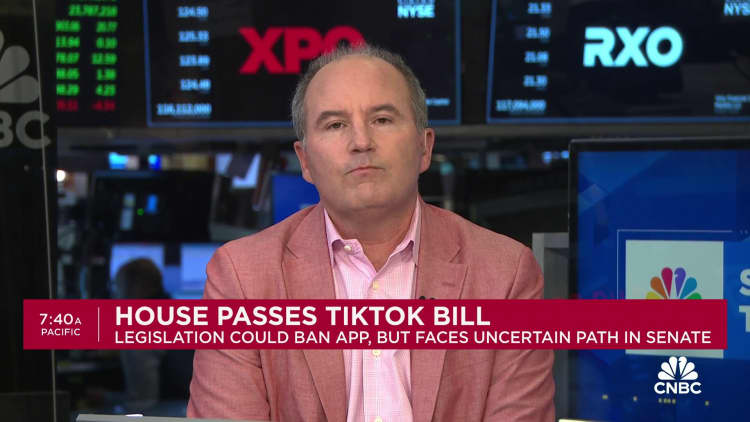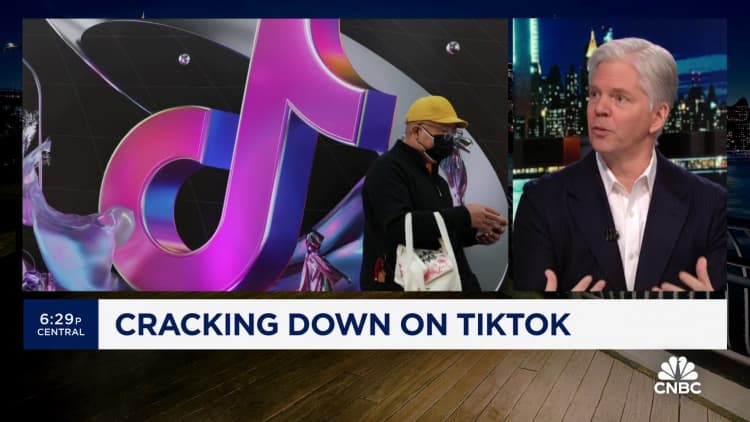
The House of Representatives approved a bill on Wednesday that would require Chinese tech giant ByteDance to divest TikTok or face a virtual ban on the popular social video app in the United States
The measure passed with an overwhelming majority of 352 votes to 65 and with one voting member present.
The legislation, called the Protecting Americans from Foreign Adversary Controlled Applications Act, was introduced by the House Special Committee on the Chinese Communist Party on March 5 by Reps. Mike Gallagher, R-Wis., and Raja Krishnamoorthi, D-Illinois. Two days later, House members on the Energy and Commerce Committee voted unanimously to approve the bill, which calls TikTok a threat to national security because it is controlled by a foreign adversary.
The bill now heads to the Senate, where it faces an uncertain future as senators appear divided over the legislation and other federal and state efforts to ban TikTok have stalled.
“This process was secret and the bill was pushed through for one reason: it is a ban,” a TikTok spokesperson said after the vote. “We hope the Senate considers the facts, listens to its constituents and recognizes the impact on the economy, 7 million small businesses and the 170 million Americans who use our service.”
In a short video clip posted to TikTok later that afternoon, TikTok CEO Shou Zi Chew expressed dismay to TikTok users over what he called a “disappointing vote in the House of Representatives,” saying that the bill ” brings more.” transferring power to a handful of other social media companies” and that “it also takes billions of dollars out of the pockets of developers and small businesses.”
“In recent years, we have invested in keeping your data on our platform secure and protected from external manipulation. We are committed to continuing to do so,” Chew said. “If this law goes into effect, it will result in a ban on TikTok in the United States, even the bill’s supporters admit this is their goal.”
Chew added that TikTok “will continue to do everything we can, including exercising our legal rights, to protect this amazing platform we have built with you.”
President Joe Biden, who created an official TikTok account in February as part of his campaign, has previously said he would sign the bill if it passes, and White House press secretary Karine Jean-Pierre confirmed that The White House provides: “technical assistance” in drafting the legislation. Jean-Pierre said in a media briefing on March 6 that the president would sign it as soon as “it has a legal basis and is in a place where it can come out of Congress.”
Attendees hold signs in support of TikTok at a press conference outside the U.S. Capitol on March 12, 2024 in Washington, DC.
Anna Moneymaker | Getty Images
Although House members who drafted the bill have previously stated that it “does not ban TikTok,” the legislation in its current form requires ByteDance to divest TikTok within about six months in order for the app to be “available in the United States.” remains”. If the bill comes into force, app store owners such as Apple And Google as well as internet hosting companies would be banned from supporting TikTok and other apps linked to ByteDance.
More about the TikTok ban law
Lawmakers from both parties have claimed that TikTok poses a national security risk because of the app’s alleged ties to the Chinese Communist Party, something Chew has denied in Senate hearings. On the other hand, technology policy and civil liberties organizations such as the American Civil Liberties Union and the Knight Institute have spoken out against the bill because they fear it would violate First Amendment rights.
Shou Zi Chew, CEO of TikTok, speaks before the House Energy and Commerce Committee hearing on “TikTok: How Congress can protect America’s privacy and protect children from online harm” on Capitol Hill on March 23, 2023 Washington, DC from.
Jim Watson | Afp | Getty Images
Meanwhile, Republican presidential candidate Donald Trump said in an interview with CNBC earlier this week that he was concerned that banning TikTok would also make Facebook parent company Meta a stronger company.
“You can make Facebook bigger without TikTok, and I think Facebook is an enemy of the people,” Trump said.
The former president’s comments were notable given that the Trump administration had already attempted to remove TikTok from app stores in 2020, citing national security concerns, and had also called on ByteDance to divest the app. That same year, Microsoft considered a $10 billion to $30 billion acquisition of TikTok, but ultimately talks between the two companies fell through and the Biden administration ultimately revoked the Trump administration’s order.
Angelo Zino, vice president and senior equity analyst at CFRA Research, told CNBC that if the latest TikTok bill passes, it is possible that TikTok’s pure-play U.S. business “will have a valuation of more than $60 billion could achieve” if one “looks at the competition”. Valuations on the market.”
“However, we don’t even know if it would come to that, as ByteDance could decide to simply force TikTok to cease operations in the US if forced to do so,” Zino said in an email.
Earlier this week, prominent venture capitalist and Republican megadonor Keith Rabois said in a post
“Supporting the TikTok bill is an IQ test” for members of Congress, Rabois said in an email to CNBC.
A potential ban on TikTok in the United States has left several prominent TikTok creators looking for ways to diversify their businesses and brands other than creating viral videos on the platform, CNBC previously reported.
Regard: TikTok ban isn’t censorship, it’s national security, says Beacon CEO

Source link
2024-03-14 02:44:10
www.cnbc.com






